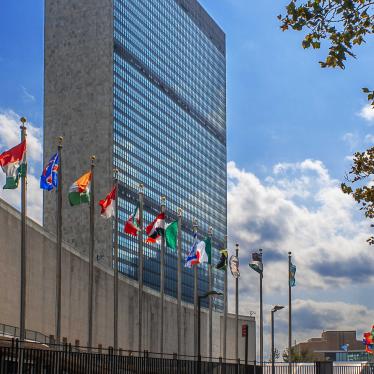Replacing the discredited United Nations Commission on Human Rights with a standing Human Rights Council would be a major step forward for the protection of human rights worldwide.
On Friday the president of the U.N. General Assembly, Ambassador Jean Ping of Gabon, presented a draft outcome document for the General Assembly Summit in September which included a commitment of support for a Human Rights Council.
The proposed Human Rights Council would operate year-round to allow it to act both preventively and during urgent crises. According to the draft outcome document, the Geneva-based Council would preserve some of the best features of the Commission on Human Rights, including the active and meaningful participation of nongovernmental organizations and the system of expert monitors known as special rapporteurs.
"U.N. members should go beyond their rhetoric on human rights and agree to the creation of a year-round and effective Human Rights Council," said Joanna Weschler, U.N. advocacy director at Human Rights Watch. "They should support the creation of this Council at the U.N. General Assembly summit in September."
The General Assembly president's draft outcome document endorses the proposal that membership of the Human Rights Council be elected directly by a two-thirds majority of the General Assembly in order to make council members more accountable to the broader U.N. membership.
Human Rights Watch endorses Kofi Annan's call that members of the new Human Rights Council abide by "the highest human rights standards."
"Kofi Annan has repeatedly insisted that development and security can only be achieved with respect for human rights," said Weschler. "The creation of a more effective human rights council will strengthen development and security as well as human rights protection."
The draft outcome document is the second important new report in just over a week setting out new directions for the U.N. human rights system. On May 26th, Louise Arbour, the U.N. High Commissioner for Human Rights, presented a proposal that would make the Office of the High Commissioner much more operational and responsive to crises on the ground. Arbour called for moving beyond the articulation of rights to the effective implementation of those rights around the world. This plan will demand considerable support from member states.
"It is high time for U.N. member states to put the Office of the High Commissioner for Human Rights at the heart of peace and security discussions and to give it the resources to fulfill a greater leadership role," Weschler said.
Human Rights Watch also welcomes the General Assembly president's conclusion that there is never any justification for deliberately attacking civilians or non-combatants, even when resisting foreign occupation.
Human Rights Watch welcomes the acknowledgement of the "responsibility to protect" as a common concern of the international community. But the final document of the General Assembly summit in September should go beyond this general statement. It should recommend the adoption of clear criteria for any use of force.
"Threats to peace and security so often grow out of human rights violations," said Weschler. "The current human rights crisis in Darfur reminds us that the responsibility to protect must be central to the U.N.'s response to any threat to international peace and security."
The final document should reflect the previously made call that permanent members of the Security Council "refrain from the use of the veto in cases of genocide and large-scale human rights abuses," Human Rights Watch said.





